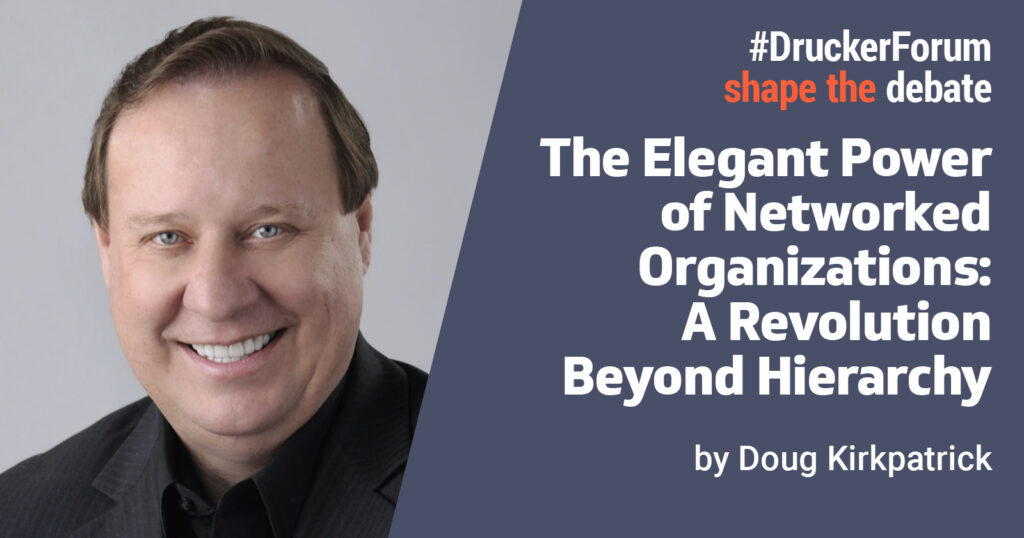
In an era defined by rapid innovation and relentless change, the bureaucratic hierarchy—once a symbol of industrial efficiency—has become a liability, stifling creativity, disengaging talent, and impeding value creation.
Networks overcome problems
Networked organizations, with their fluid, interconnected systems of competence, offer a transformative alternative, prioritizing customer value, autonomy, and adaptability over rigid control. The newly crystallized Lisbon Principles[1], having attracted multiple CEOs as signatories, prioritize autonomous networks over hierarchies of authority.
It’s worth exploring the specific advantages of organizing companies as networks, illuminating their potential to reshape business for a dynamic, value-driven world.
Adaptability
Networked organizations excel in adaptability. Hierarchies, with their layered chains of command, rely on standardized processes that slow responses to market shifts. Boeing’s well-documented bureaucratic woes, culminating in two 737 Max crashes and its 2024 Starliner fiasco, illustrate the problem. A culture of siloed decision-making and excessive oversight delayed critical safety updates to the jet’s MCAS software, despite known flaws, contributing to two tragic crashes that killed 346 people. Internal red tape and a focus on cost-cutting over innovation hindered responsiveness, eroding trust in the flying public.
In contrast, networks enable rapid pivots through free-flowing information. Spotify deploys self-managed teams known as squads, which are small, cross-functional groups of 6-12 individuals equipped with all the skills needed to design, develop, test, and release features independently, allowing them to operate like mini-startups focused on specific product areas such as music recommendations or user interfaces. These autonomous teams release continuous software updates based on user feedback, easily outpacing their more bureaucratic competitors.
Intrinsic motivation
Networks foster intrinsic motivation and ownership. Hierarchies breed disengagement by confining employees to rigid roles. Gallup data shows that global employee engagement declined to just 21% in 2024.[2] Fortunately, networked organizations are serving as beacons of light in the treacherous waters of disengagement. Networks empower individuals as value creators, accountable to peers and ultimately to customers. 3M has a 15% rule that Jayshree Seth describes as part of their “storied culture,” which allows employees to dedicate 15% of their time to personal projects that foster cross-team collaboration and innovation, helping retain diverse talent.[3]
Customer centricity
Networked organizations prioritize customer-centric value creation. Bureaucracies focus on internal metrics, often neglecting end users. If employees are focused on pleasing bosses, who is focused on pleasing the customer? Boeing’s fixation on cost efficiencies and regulatory compliance over passenger safety during the 737 Max development alienated customers and regulators, leading to a global grounding.
Networks align resources with customer needs, bypassing silos.
Buurtzorg’s networked teams of nurses deliver patient-focused care, achieving 30% cost savings and higher satisfaction compared to hierarchical rivals. Google’s networked approach enables personalized digital services, enhancing loyalty. Morning Star’s self-management focus leads to high engagement coupled with high autonomy and accountability.
This customer-first focus ensures networks deliver superior value, unlike hierarchies where signals are lost to process noise.
Empathy and human connection
Networks cultivate empathy and human connection, vital for leadership. Hierarchies prioritize control, as seen in Boeing’s top-down suppression of safety concerns.
Networks foster empathy, enabling deep understanding of customers and colleagues.
IDEO’s networked design teams use empathy-driven design thinking to create user-centric products, like intuitive medical devices. Nvidia’s networked structure encourages collaborative innovation, resonating emotionally with users.
Unlike Enron’s systemic ethical failures, networks build cultures of trust and collaboration through the power of transparency and widely dispersed information.
Waste elimination
Networks eliminate bureaucratic waste. Hierarchies incur “adminogenic harm”—meetings, reports, compliance—costing $3 trillion annually in excess bureaucracy, according to Gary Hamel and Michele Zanini.[4] Boeing’s layers of oversight delayed 737 Max fixes, exacerbating costs and reputational damage.
Alternatively, tech-enabled networks minimize overhead through what Rita McGrath and Ram Charan term the permissionless corporation.[5]
W.L. Gore’s lattice structure, without titles, reduces costs and speeds Gore-Tex innovation and product development. Amazon’s autonomous teams drive rapid advancements, like its delivery app, bypassing bureaucratic layers.
Networks liberate human beings and resources for value-adding work.
Exponential impact
Networks harness technology for exponential impact. Hierarchies use tech for control, stifling innovation.
Networks leverage tools like AI and collaborative platforms for agility.
GitLab’s remote networked structure enables 1,700 employees across 60 countries to co-create software seamlessly. Blockchain-based networks in decentralized finance offer transparent peer-to-peer contracts. Morning Star’s peer network based on Colleague Letters of Understanding (CLOU) enabled it to scale and become the world’s largest processor of tomato products.
Bureaucratic firms like the once-mighty Sears, failing to integrate e-commerce, lost badly to Amazon’s networked agility.
Entrepreneurial leadership
Networks nurture entrepreneurial leadership. Hierarchies produce risk-averse administrators, as Boeing’s cautious handling of 737 Max issues showed.
Networks cultivate leaders with ingenuity and tenacity.
Valve Corporation’s networked structure allows employees to self-select projects, fostering innovators behind games like Half-Life. Unlike Blockbuster’s hierarchical and technological stagnation, networks prepare leaders for uncertainty.
Networked organizations are essential for today’s economy. Their advantages are adaptability, motivation, customer focus, empathy, efficiency, technological leverage, and leadership development.
This shift from control to collaboration is a cultural and structural revolution, ensuring businesses thrive when competence, not authority, reigns supreme.
About the author:
Doug Kirkpatrick is an organizational change consultant, executive coach and educator.
November 5, 2025
Workshop: Why Leaders Must Accelerate Value Creation
Location: dasForum, Operngasse 17–21, 11th Floor, 1010 Vienna
Learn how the world’s fastest-growing firms think and act differently: detecting change sooner, mobilizing innovation, leveraging AI for human-centered goals, and compounding long-term value. In this hands-on session, you’ll work with peers to translate an integrated, multi-dimensional leadership model into concrete steps for your organization—covering mindsets and culture, customer-first innovation, networks of competence (not steep hierarchies), distributed entrepreneurship, and outcomes for all stakeholders.
With:
- Steve Denning, Author and Independent Management Consulting Professional
- Hugo Lourenco, Distinguished Entrepreneur, Board advisor, Thought leader
- Heidi Musser, cXo, master Agilist, advisor, mentor, TEDx speaker
- Doug Kirkpatrick, Organizational change consultant, executive coach and educator
Registration: https://www.druckerforum.org/2025/workshops/
Workshops are free for registered Global Peter Drucker Forum participants.
Not attending the Forum? You may express interest; we’ll confirm based on seat availability.
[1] https://www.managementsummit.org/lisbon-value-creating-principles
[2] https://www.gallup.com/workplace/349484/state-of-the-global-workplace.aspx
[3] https://www.linkedin.com/pulse/raising-influence-science-engineering-rise-shine-jayshree-seth/
[4] https://www.forbes.com/sites/stevedenning/2016/03/29/gary-hamels-3-trillion-prize-for-killing-bureaucracy/
[5] https://hbr.org/2023/01/the-permissionless-corporation

